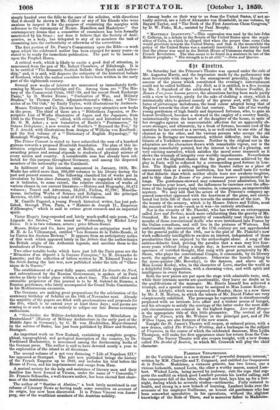tot thratrts.
On Saturday last the Princess's Theatre was opened under the rule of Mr. Augustus Harris, and the impression made by the performance was most favourable with respect to the management generally, though the success of the pieces which constituted the evening's entertainment could not be called brilliant. Ivy Hall, as it is entitled, is a free version by Mr. J. Oxenford of the celebrated work of M. Octave Feuillet, Le Boman d'un jeune homme pauvre, the alterations having been made partly with a view to brevity, partly for the sake of clothing a story, which is intrinsically akin to genteel comedy of the graver sort, with the attri butes of picturesque melodrama, the local colour adopted being that of England towards the close of the last century. The tale of the worthy young gentleman of high family and depressed fortunes, who, to gain an honest livelihood, becomes a steward in the employ of a country family, unintentionally wins the heart of the daughter of the house, in spite of her struggles against an unaccountable affection for an apparently ob- scure stranger, and ultimately, by a freak of fortune, becomes lord of the mansion he has entered as a servant, is as well suited to one side of the channel as to the other, and the various persons who occupy the old château in Bretagne are transmuted, without difficulty, into the inha- bitants of a Yorkshire manor-house. Neither in the original nor in the adaptation are the characters drawn with remarkable vigour, nor is the language remarkably pointed, but the interest is that of a pleasing, not very exciting narrative, which satisfies the moral sense inasmuch as it shows the triumph of integrity over worldly impediments. Nevertheless there is not the slightest chance that the great success achieved by the play in Paris will be reflected by a corresponding good fortune in Lon- don. The English public, regarding the theatre rather as a place of amusement than as a serious institution, has but small taste for works of that didactic class which neither elicits tears nor awakens laughter, and to this class Is Boman d'un fame homme pauvre preeminently be- longs. The gentleman-steward may command your admiration, but he never touches your heart, and the influences he exercises over the affec- tions of the haughty young lady remains, in consequence, an impenetrable mystery. We may add that the actors of the Princess's company ap- peared somewhat oppressed with the heaviness of the piece, and contri- buted but little life of their own towards the animation of the text. To the beauty of the scenery, which is by Messrs. Grieve and Telbin, must the success of the work—such as it was—be entirely attributed.
Nor is the vivacity of Mr. Planche, who has written an extravaganza called Love and Fortune much more exhilarating than the gravity of Mr. Oxenford. He has put a quantity of remarkably neat rhyme into the months of those conventional drolls who were introduced into France by the Italian comedians, and still live in the pictures of Watteau. But unfortunately the conventions of the 17th century are not apprehended by the general public of the 19th, nor is the plot of Mr. Planche's new work sufficiently intelligible to awaken an interest, independent of those peculiarities that are enjoyed by the archmologist alone. A song of the satirico-didactic kind, proving the paradox that a man may live four- score years without living a single day, is however such an excellent specimen of vertified thought, that sung with great perspicuity by Mr. Shore, who plays the conventional Crispin, it commands, by its literary merit, the applause of the audience. Otherwise the laurels belong to the, scene-painter (Mr. Beverley), to the dancers, and above all to Miss Louise Keeley, who, in the character of Love, startles the world as a delightful little apparition, with a charming voice, and with spirit and intelligence in every feature. Both the new pieces are put upon the stage with admirable taste, and, while their intrinsic merits are questionable, they leave no doubt as to the qualifications of the manager. Mr. Harris himself has achieved a triumph, and a special ovation may be assigned to Miss Louise Keeley. At the Adelphi, which was reopened on Monday, there is a new farce by Mr. J. M. Morton, in which the talents of Mr. David Fisher are very conspicuously exhibited. The personage he represents is simultaneously perplexed with an intricate love affair and a violent access of hunger, and his attempts to satisfy the cravings of the latter under the most diffi- cult circumstances are comical in the highest degree. Love and Hunger is the appropriate title of this little pleasantry. The revival of One Touch of Nature, with Mr. Webster in the principal part, and of The Willow Copse, are also features of the new season. Tonight the St. James's Theatre will reopen, at reduced prices, with a new drama, called The Widow's Wedding, and a burlesque on the subject of Virginius, in the course of which the celebrated danseuse, Miss Lydia Thompson, Will make her first appearance since her return from the Con- tinent. The Surrey Theatre will also reopen tonight, with a new drama called The Bridal of Beatriz, in which Mr. Creawick will play the chief character.


























 Previous page
Previous page